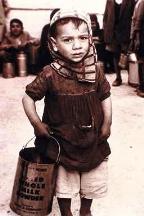
















Charity During Hard Times
Copyright © November 17, 2007 by Robert Wayne Atkins, P.E.
All Rights Reserved.
The Basic Problem
 Hard times usually result in an overwhelming number of people:
Hard times usually result in an overwhelming number of people:
- who do not have a job of any kind, and
- who have no steady income from any source, and
- who are either homeless or are living with close relatives.
During hard times these individuals need almost everything, including food, shelter, clothing, and basic medical care.
During really hard times the large and growing number of homeless individuals greatly exceeds the carrying capacity of the local community in terms of voluntary charitable donations. There are just not enough homeless shelters and free food-soup kitchens that provide one meal per day to accommodate everyone. To survive during hard times these homeless individuals must choose between becoming thieves or beggars or both.
Therefore during hard times the crime rate increases significantly. Since God was expelled from our school systems and our work places many decades ago, there are now a large number of people who have little or no respect for any type of authority, or for the rights of anyone other than themselves. These individuals do not evaluate their actions on any moral or ethical principles other than whether or not their action results in an improvement in their own personal welfare.
Therefore as our current hard times tragedy continues to unfold, any family that still has a home that contains a wage earner will quickly learn that if they are going to continue to survive they must not make themselves an obvious or easy target for thieves or a target for a continuous stream of beggars.
Each individual family will need to make their own decision on whether or not they can afford to be charitable. Some families are already in such serious financial difficulty that they are barely able to meet their own basic survival needs and charity is simply not an option. Other families may be a little better off and they may be able to afford a little charity every now and then. The difficulty is that homeless families do not need help every now and then; they need it continuously.
If a person or family makes the decision to dispense charity directly from their home or apartment, then they may experience the following problems:
- Having anyone and everyone knocking on your door at any time of the day or night.
- Receiving verbal abuse, or something worse, when you honestly have no charity to give away at the current time.
- Experiencing the occasional angry face-to-face confrontation with an individual or family that is not grateful for what you do offer to give to them, and they accuse you of being able to give more and they demand that you do so or suffer the consequences.
For these reasons, among others, a prudent family will need to determine how they can be charitable without putting the safety of their own family at risk.
One Possible Solution
 Fortunately there is a simple solution to this charity dilemma. After determining what they can actually afford to give away, each family can make donations of money, food, clothing, and/or medicine to a local food bank (food pantry), homeless shelter, orphanage, or local church with the stipulation that the gift be used to help the needy families in the local area.
Fortunately there is a simple solution to this charity dilemma. After determining what they can actually afford to give away, each family can make donations of money, food, clothing, and/or medicine to a local food bank (food pantry), homeless shelter, orphanage, or local church with the stipulation that the gift be used to help the needy families in the local area.
This giving strategy is not new. It was recommended by Jesus Christ in Matthew 6:3-4: "But when you do a charitable deed, do not let you left hand know what your right hand is doing, that your charitable deed may be in secret; and your Father who sees in secret will Himself reward you openly."
Charitable donations may be made to an organization that is near the donating family, or to one that is a reasonable distance away if anonymity is desired. The advantage of donating to a nearby establishment is that the donating family can direct any beggars to its location. The family would not have to mention whether or not they personally donated anything of value to the charitable organization; they could simply say they heard that food was available there.
During hard times the beggar (hobo) information network works extremely well and everyone knows which homes always say "no" and which ones sometimes say "yes" and which ones always "give directions to the nearest charitable organization." You can put a simple note and a directions map on your front door (or gate) to help reduce the number of beggars who actually knock on your door. The note could be written in English and Spanish. Without opening the door, you could ask who is knocking and what their business is, and then give directions through the closed door. Remember that an innocent looking beggar could also be a very skilled thief and/or killer. Always keep your doors closed and bolted during hard times and ask and answer questions through the door. Do not open your door even to those who actually have or pretend to have hearing deficiencies. The note on your front door should be adequate to answer any question the hard of hearing may have.
To the extent possible, try to be polite to everyone who knocks on your door. Just remember that at some point in the future it could be you and your family on the outside knocking on someone else's door. However, after you have given directions to the charitable organization, if the person or family continues to be persistent and will not leave then you may need to call 911 and report them. (Note: If this problem repeats itself too often then you may need to add a sentence to the note on your door or gate that says you will immediately call 911 and report anyone who knocks on your door to ask for any type of donation.)
During serious hard times the local churches and their leaders will be confronted with an increasing and overwhelming number of requests for help. Many churches will respond by setting up committees to oversee the collection, storing, and distribution of food, clothing, and other supplies to needy families. Some churches already perform this function in their communities on an ongoing basis, and they distribute food to needy families once a week, or every other week, or once a month. (Note: During serious hard times a once per week distribution would be preferred so the families that are newly added to the distribution list do not have to wait too long before receiving assistance.)
The advantage of making your charitable donations to a church or other charitable organization is that they can more equally distribute the available charity to everyone who is in need. And when the charity is all gone, those who received it will know that more will not be available until some future time, whether it is a free hot meal the following day, or a few more free groceries one week or one month from now.
A nearby local church or other charitable organization is a superior method for equitably distributing charity to everyone who is in need for all the following reasons:

- They will receive charitable donations from anyone regardless of whether or not the individual is a member of the organization or church.
- They are usually located within a reasonable distance of the families who are donating the charity.
- They are usually within walking distance or bicycle distance of the needy families.
- They distribute charity to local residents and individuals passing through the community and therefore they help to relieve local suffering and reduce the local crime rate.
- They minimize the chance of one family receiving more charitable assistance than another family.
- The local charitable organization usually knows if any work is available locally and they will pass that information on to the welfare recipients. This helps those in charge of dispensing charity to identify the families who have members who could work but chose not to. Families who accept work assignments and faithfully discharge those work duties will also usually be told where they can rent a meager but simple room to live in.
- The recipients of the charity do not have to be members of the church or charitable organization.
- The recipients of the charity will quickly learn where and when the charity is being distributed and this will help to minimize their investment in time and energy in searching for assistance.
- The recipients of the charity will quickly learn that it is fruitless to beg door-to-door in a local area because anyone who has anything to give has already donated it to the local charitable organization.
- The recipients of the charity will be able to maintain some of their dignity and self-image because they will not be forced to beg door-to-door and humble themselves before anyone and everyone who opens the door.
- It provides everyone in the local area with an immediate and helpful answer to anyone who is in need of assistance. No one ever has to say, "No, I can't help you." Instead everyone can provide directions to the nearest charitable organization.
- When the total amount of available charity in an area is not adequate to sustain all the families in that area that need charity assistance, then some of those families will realize it is time to move on to another area where the overall economic conditions might be more favorable.
If you chose to make your charitable donations to a local church or other charitable organization then you will need to be consistent. Except for close family members it would be unwise to make exceptions for anyone, including your close friends and neighbors. You do not want to be put into a position where you have to chose which of your friends or neighbors are worthy of your assistance and which ones are not. Those that you are not able to help will quickly turn on you and they will hate you and this could eventually result in a disaster for you and your family.
It would be much better to say to everyone, whether it is one person or a small family or a large group of people, that food and other assistance is being freely distributed at a local charitable organization and then give directions to that organization. You should not tell anyone whether or not you actually contributed anything to that organization because if you do then it could result in resentment against you for not giving your donation directly to your friend or neighbor. These individuals will also remember that you had extra resources to share at a time when they did not, and as the hard times continue they will reflect on that fact over and over and it may eventually lead to an attack on your home or apartment.
Nobody has the resources to feed, shelter, and clothe all their friends and neighbors for an unknown period of time. The current hard times we are experiencing will probably continue to get worse for many years. If you make an exception for anyone in the early phase of the hard times tragedy, then that person or family will expect you to continuously assist them for the duration of the event, even if you tell them that the original donation is a one-time gift when you first give it to them. It would be much better to not start a dependency relationship than to start one and then have to stop it. After the initial gift of resources has been consumed that family will return to beg at your doorstep every day, and each day you don't give them something their hatred and suspicions about you will grow and this could eventually lead to a disaster for you and your family.
Conclusion
If our economy continues to weaken, then more and more people will lose their jobs and their homes. The government will not be able to help them in any meaningful way because the true unemployment rate will be extremely high and the government's tax revenues will be seriously reduced. The government will not have the money or the resources to help all the homeless families survive. (Note: If the government simply issues more money then this will only result in hyperinflation and it will not solve the original problem. Instead it will create a variety of new problems and it will actually make the hard times much worse.)
As the number of homeless families gradually increases there will eventually come a time when their combined needs will exceed the available supply of charitable donations and government assistance. When that happens each homeless family will not receive enough assistance to sustain itself. If our economy degenerates to the point where a large number of us cannot meet our minimum needs for survival then the events that will follow are not pleasant ones to contemplate.
In closing may I suggest you read the book written by Pitirim A. Sorokin called "Man and Society in Calamity." It contains true historical information about how starving individuals have actually behaved during previous hard times. A condensed summary of his book can be read at my web site by clicking on the following link:
Man and Society in Calamity.
Respectfully,
Grandpappy.
Grandpappy's e-mail address is: RobertWayneAtkins@hotmail.com




































 Hard times usually result in an overwhelming number of people:
Hard times usually result in an overwhelming number of people: Fortunately there is a simple solution to this charity dilemma. After determining what they can actually afford to give away, each family can make donations of money, food, clothing, and/or medicine to a local food bank (food pantry), homeless shelter, orphanage, or local church with the stipulation that the gift be used to help the needy families in the local area.
Fortunately there is a simple solution to this charity dilemma. After determining what they can actually afford to give away, each family can make donations of money, food, clothing, and/or medicine to a local food bank (food pantry), homeless shelter, orphanage, or local church with the stipulation that the gift be used to help the needy families in the local area.

